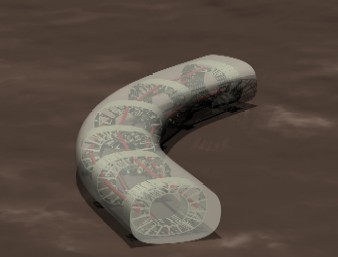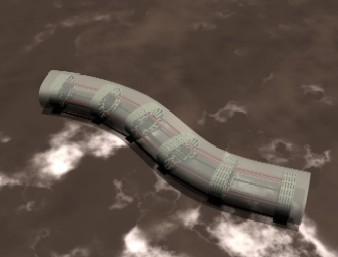Listen to 6 minute edit of BBC Radio 4
programme: "Natural Technology", broadcast in May 2001. MP3
version
MOBIUS research focuses on two goals:
(1) The creation of a new biologically-inspired algorithm that exploits both evolution and processes of developmental biology to enable computers to find solutions to large-scale, complex problems, overcoming current scalability problems in evolutionary computation.
(2) The demonstration of this algorithm on a novel combination of "smart materials" (such as shape memory alloys and rapid prototyping technologies) for the design of self-adapting forms.
It is anticipated that the research will pave the way to considerable advances in future technology, for example:
- new computational development algorithms capable of finding solutions to large or complex problems
- new methods to create autonomous, self-adapting forms tailored to different environments, capable of movement and sensing (for example, a device able to redesign and alter its morphology to satisfy different aerodynamic or radar requirements like a chameleon changing its color to avoid detection, or a device able to reconfigure itself to maximise solar power gathering efficiency like a plant growing towards light).
![]()
Shape Shifters! (Funded by EPSRC and BAE Systems)
Current work is investigating the use of shape memory alloys controlled by evolution to enable robot forms capable of changing their shape. We’re beginning with a snake, which may look something like this:
|
|
|
The first prototype (a single-segment snake that moves like a caterpillar) has been built by Siavash Mahdavi. A genetic algorithm was used to evolve an appropriate sequence of muscle contractions to enable its movements. To watch it crawl, click here: (Real media streaming video small) or here: (Real media streaming video, large image). To watch it before it learned how to crawl, click here: (Real media streaming video small) or here : (Real media streaming video, large image).
![]() The latest prototype snake
looks like this:
The latest prototype snake
looks like this:

![]()
Fractal Development (funded by EOARD)
Work is also investigating the use of proteins constructed from subsets of the Mandelbrot Set, which are evolved and used during a developmental process with the computer. Recent work has shown that the developmental system is highly evolvable, and can be used for various tasks including function regression and robot control.


![]() There are now several
papers on Fractal Proteins available from Peter Bentley’s publications
page.
There are now several
papers on Fractal Proteins available from Peter Bentley’s publications
page.
![]()
WATCH THIS SPACE FOR MORE DETAILS!
RESEARCHERS:
Dr. Peter J. Bentley (Computer Science, UCL)
Siavash Mahdavi (Computer Science, UCL)
[and the invaluable assistance of Sanjeev Kumar, Lewis Wolpert, Michel Kerszberg]
COLLABORATORS:
Dr. Mark A. Miodownik (Mechanical Engineering, Kings College London)
Dr. Julian Miller (Computer Science, Birmingham)


